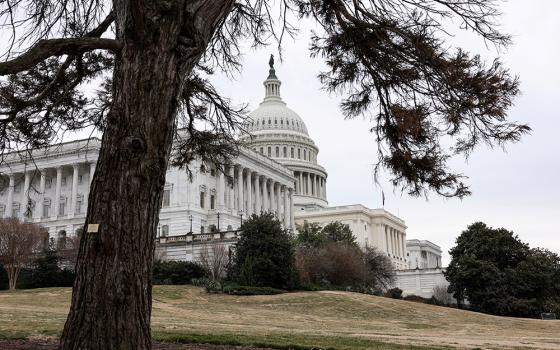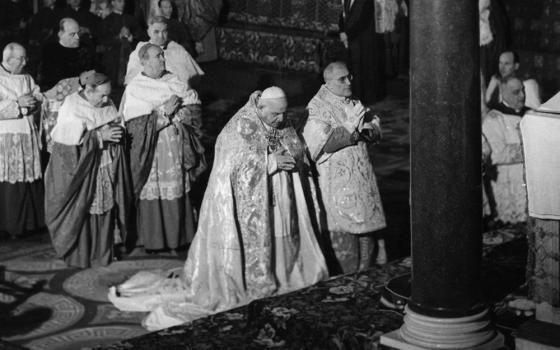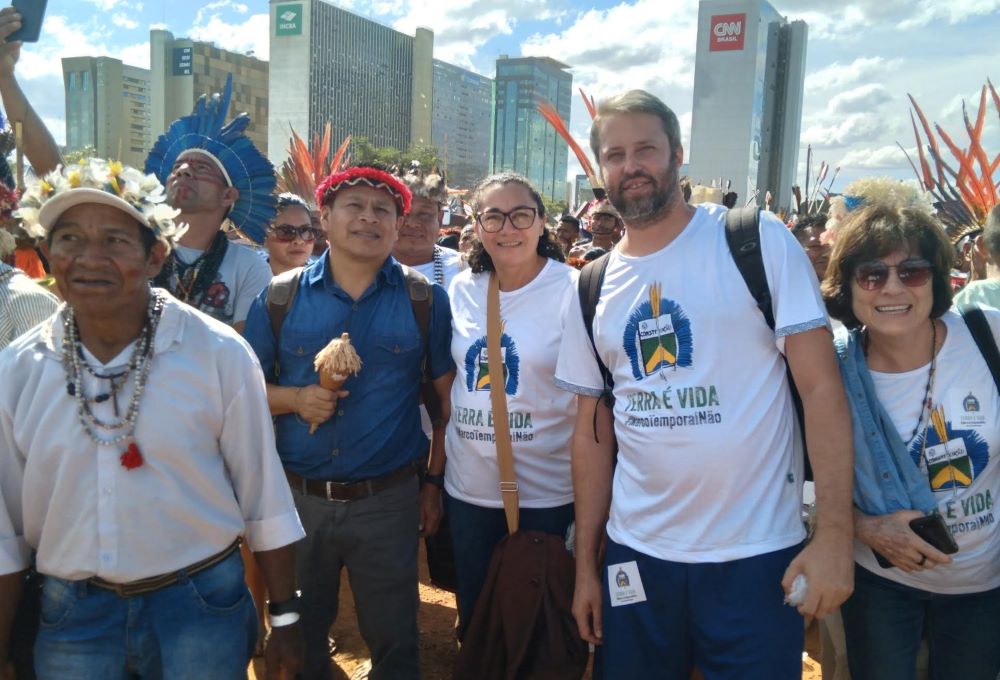
Franciscan Sisters of Our Lady of Aparecida Sr. Joana Ortiz protests the temporal framework with Indigenous people in Brasilia, Brazil. The proposed legislation limits the recognition of new Indigenous reservations to lands occupied by the original inhabitants before the 1988 constitution. (Courtesy of Joana Ortiz)
Catholic nuns working with Brazil's Indigenous population are concerned about a proposed bill that limits the recognition of new Indigenous reservations to lands occupied by the original inhabitants before the 1988 constitution.
Should the bill pass (requiring both the senate and President Lula da Silva's endorsement), all lands that Indigenous groups did not occupy in 1988 — demarcated or not — would be up for grabs for ranchers, miners and farmers.
Defenders of the policy — the so-called temporal framework — claim the law (approved by the country's lower congressional house in May) is necessary to clarify legal certainty on the issue of land demarcation and, above all, to prevent farmers from losing their land. They argue that if not approved, the entire Brazilian territory could be claimed as Indigenous land, which would lead to questions about property ownership.
According to the Indigenous Missionary Council, or CIMI, an entity linked to the National Conference of Bishops of Brazil, the bill "seeks to make the demarcation of indigenous territories unfeasible and legalizes genocide against peoples in voluntary isolation by allowing contact with these populations."
"Most of the territories of the Guaranis and Kaiowas Indigenous in Mato Grosso do Sul are not demarked, and many which are demarked were granted after 1988,” said Sr. Joana Aparecida Ortiz of the Congregation of the Franciscan Sisters of Our Lady of Aparecida, who has been working with these groups since 2010.
'Many religious and many committed lay people would give their lives for this mission, because they see that Indigenous people defend life on the planet.'
— Sr. Irma Maria Ines Vieira Ribeiro
Ortiz said that religious working with these groups fear that even land that has already been deemed Indigenous territory will be taken away from its original stewards.
"It wouldn't just be a genocide," said Ortiz, who is also a member of CIMI's Mato Grosso do Sul chapter. "It would be an ethnocide here in Mato Grosso do Sul if the temporal framework is approved."
In 2022, at least 36 cases of invasions and damage to Indigenous property were reported and 60 groups of isolated Indigenous peoples were seen, according to CIMI's annual "Violence Against Indigenous Peoples of Brazil," released July 26.
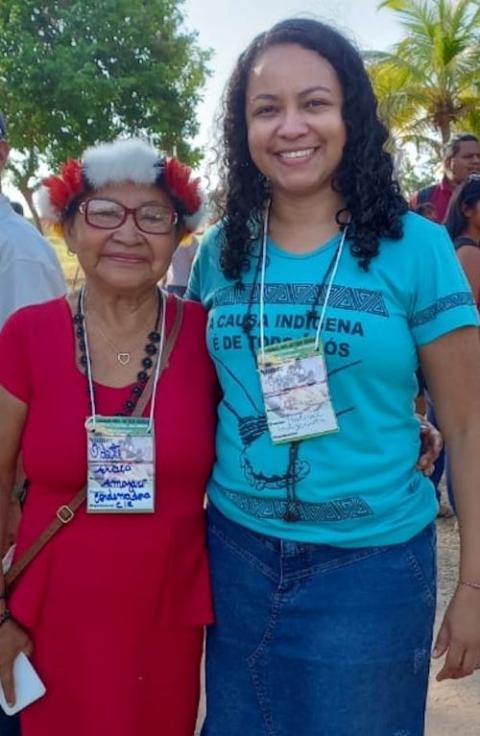
Sr. Catarina de Sousa de Oliveira, a Daughter of the Immaculate Heart of Mary, stands with an Indigenous elder in the Amajari region of Roraima state, Brazil. (Courtesy of Joana Ortiz)
According to the organization, under the presidency of Jair Bolsonaro, the Brazilian state carried out the "biggest and most systematic attack on the rights of Indigenous peoples since the time of re-democratization." During Bolosnaro's term, 795 Indigenous people were murdered in Brazil.
According to CIMI's report, the current invasion of territory and violent conflicts in Yanomami territory echoes to the gold rush of the 1980s and 1990s, as well as the 1993 Haximu massacre, the first case judged as genocide in Brazil.
"We have arrived at this situation again thirty years later," the report said. "On the one hand, the new expansion cycle of mining within the Yanomami territory in the last five years, [and] on the other, the dismantling of health care for the Yanomami and Ye'kwana peoples."
Franciscan Catechist Sr. Laura Vicuña Manso in the Amazon region faces a similar situation. She works with the Karipunas peoples, whose lands were demarcated in 1998 and could be subject to return to the federal government if the temporal framework is approved.
"The situation has always been critical," she told GSR. "We have had land invasions since 2017, and now there is one more aggravating factor, which is the Brazilian state trying to legitimize these illegal invasions."
"How can people sleep peacefully with this issue [of legal uncertainty] always hovering over us?" Manso asked
In addition to the legislative debate, Brazil's supreme court is also discussing whether the temporal framework and the 1988 cutoff date for the legal recognition of Indigenous lands is constitutional.
Sr. Catarina de Sousa de Oliveira said she believes it to be unconstitutional.
"Its approval puts not only Indigenous territories at risk, but the entire struggle to guarantee all the Indigenous rights already granted," added Oliveira, a Daughter of the Immaculate Heart of Mary.
According to Holy Cross Sr. Michael Nolan, who has been a lawyer for CIMI for 30 years, the rights of the Indigenous to the land can be changed only by a new constitution.
"It is an ironclad clause, written in stone, so there is no point in making a law since it will be declared unconstitutional by the supreme court," Nolan said.
In June, however, the court — which began voting on the issue in 2021 — once again suspended discussions on the matter, after one justice asked for more time to review the case.
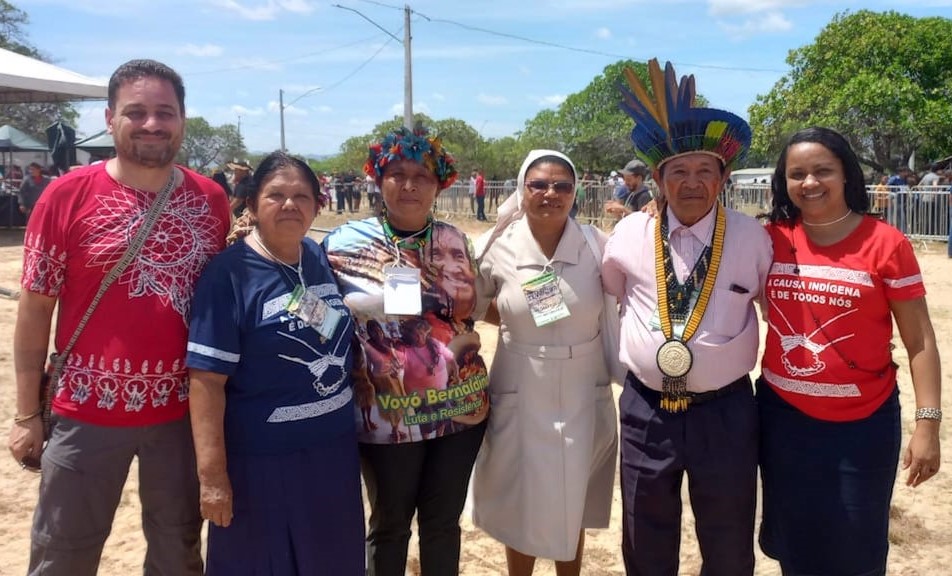
Daughter of the Immaculate Heart of Mary Sr. Catarina de Sousa de Oliveira (in red) works with Indigenous in the Amajari region of Roraima state in the Amazon forest. (Courtesy of Joana Ortiz)
This delay worries Nolan.
"How many forests are going to be destroyed while justices fight in the supreme court?" she said. If the delay is long, she added there will be years of legal uncertainty, with people "applying" the law while the issue remains unresolved.
"I think we may face a very violent moment; I think we have to prepare for a lot of violence," she said. "Indigenous peoples have already assumed the leading role in their history. They are starting to get tired, restless [with this uncertainty]."
Messenger of Divine Love Sr. Irma Maria Ines Vieira Ribeiro, former president of the Congress of Religious of Brazil, said that both Indigenous and those working with the native communities will not leave peacefully the land they call their home if farmers or miners try to invade.
"There could be martyrs in Brazil. Many religious and many committed lay people would give their lives for this mission, because they see that Indigenous people defend life on the planet," added Ribeiro, who is now a consultant of the Congregation for Institutes of Consecrated Life and Societies of Apostolic Life.
Although the sisters favor a peaceful position, "Indigenous people are tired of being disrespected," she said, and tension is already escalating in many Indigenous communities. One example is in Dourados, Mato Grosso do Sul. In April, about 110 Guarani Kaiowá families reoccupied an area neighboring the populous Dourados Indigenous Reserve to try to prevent the construction of a luxury condominium on land they say is sacred.
Police responded to the Guarani Kaiowá with tear gas bombs, rubber bullets, and they arrested nine leaders.
Although the protests halted construction, conflicts between the Indigenous community and the companies continue.
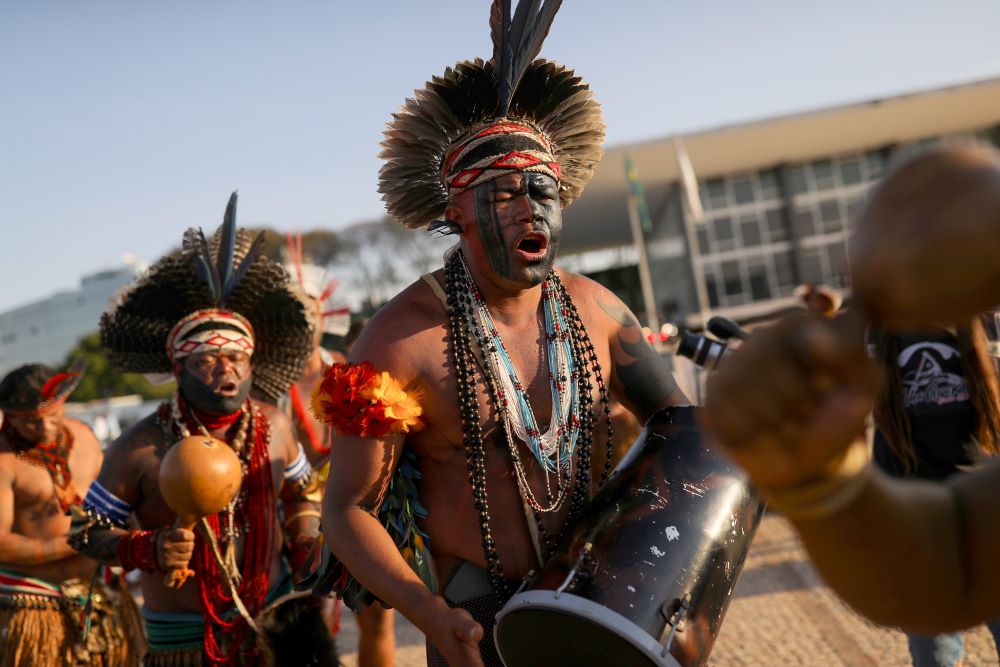
Indigenous people take part in a protest in Brasilia Aug. 25, 2021, the first day of Brazil's supreme court trial of a case on Indigenous land rights. (CNS/Reuters/Adriano Machado)
Franciscan Catechist Sr. Zelia Maria Batista, who works with the Indigenous in Dourados, said the state's Guarani and Kaiowa communities had faced a humanitarian crisis even before the threat of having their land taken away.
"There are no public policies of any kind aimed at assisting the families that find themselves on reservations, near major highways and surrounded by farms," she told GSR.
But even with the pending bill, "we fear no further violence, because the violence has already reached its peak when human life and the life of creation are decimated."
"We are pacifists," Ribeiro continued. "We follow Jesus, who is meek and humble, from the heart; and our mission is to preach the Gospel of peace, of justice, in truth, and not to support situations of conflict and death. But if necessary, we have to fight with them and we will die together."
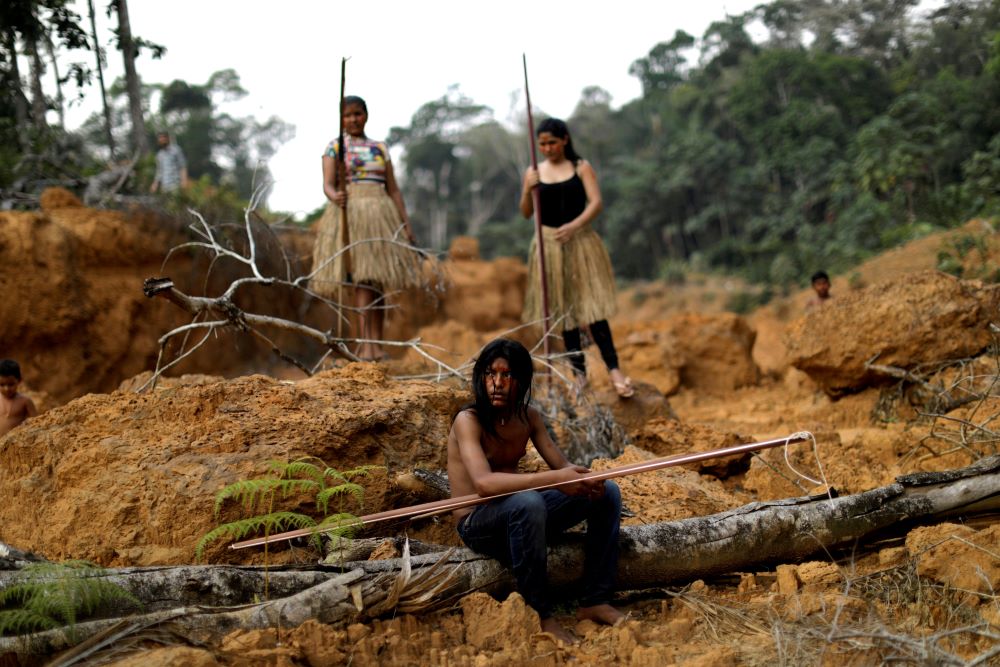
Young people from the Mura tribe are pictured in a file photo at a deforested area on unmarked Indigenous lands inside the Amazon rainforest near Humaita, Brazil. (CNS/Reuters/Ueslei Marcelino)
The possibility of escalating violence, however, does not scare these religious who work with Indigenous populations all over the country. They told GSR that even if the temporal framework is approved and violence increases, they will not abandon their work.
"It is not the profile of the women religious I know who are at the forefront of work with the Indigenous people, who face the struggle with the Indigenous people, to move away from the fight," Ribeiro said. "The religious sisters work with Indigenous lives; they live among them and defend their lives, their rights; and they will keep fighting for them."
For Ortiz, whose grandmother belonged to the Guarani tribe, violence will not dissuade them from their mission.
"I think that when we opt for the Gospel, we opt for life," she said. "It is at this time that we will strengthen ourselves and create more alliances for this life to prevail."
Others said their work may change, but they are committed to staying engaged.
If the bill passes, "The mission will continue; life is a missionary project that never goes away,” said Consolata Missionary Sr. Mary Agnes Njeri Mwangani, a Kenyan missionary who came to Brazil in 2000 to work with the Yanomamis in Roraima state.
Advertisement
Nolan echoed the sentiment, adding that sisters will not abandon the Indigenous people under any circumstances."
"We have been with them for 50 years. We will remain firm and side by side with the [Indigenous] people in their fight because that land is sacred to them," the CIMI lawyer said.
Nolan, however, added that everyone in the church, as well as the state, will be required to put into practice the philosophy of nonviolence and a lot of dialogue among the Indigenous and landowners, farmers and miners.
"If the supreme court decides that the Indigenous peoples' right to land started when they were here, and that they should keep the lands, the people who will be removed from these lands, who bought them in good faith, should be compensated by the state,” Nolan said, referring to the many farmers who acquired their land in the 1960s and '70s.
Still, she said it is unlikely that these farmers and miners will move out without a fight. "Many are not likely to leave peacefully," she said.
To become law, Brazil’s senate needs to approve the congressional bill for the president to then sign, though he has publicly stated opposition to it.
The Senate was expected to start reviewing the bill in August and vote on it by the end of December. The Senate had not addressed the bill as of Aug. 19.
If the temporal framework is accepted, Nolan said sisters are likely to take cues from the Indigenous peoples on next steps.
"The Indigenous peoples are protagonists of their own rights" she said. "It is not the role of the church to take the place of the Indigenous people; the Indigenous people have the right to decide what they are going to do. … Our work as missionaries is to be present and show Christian solidarity."





